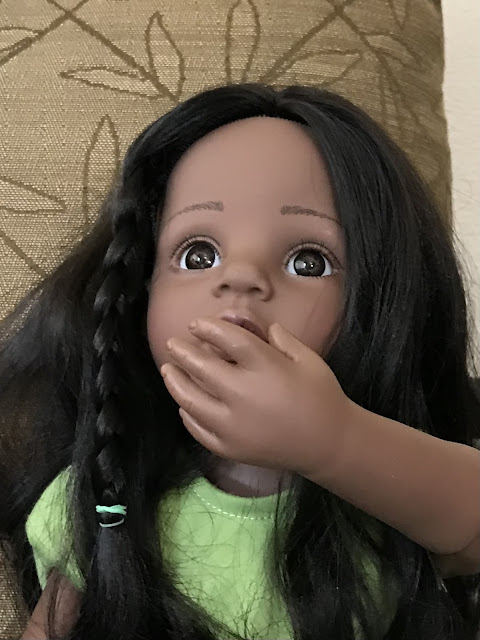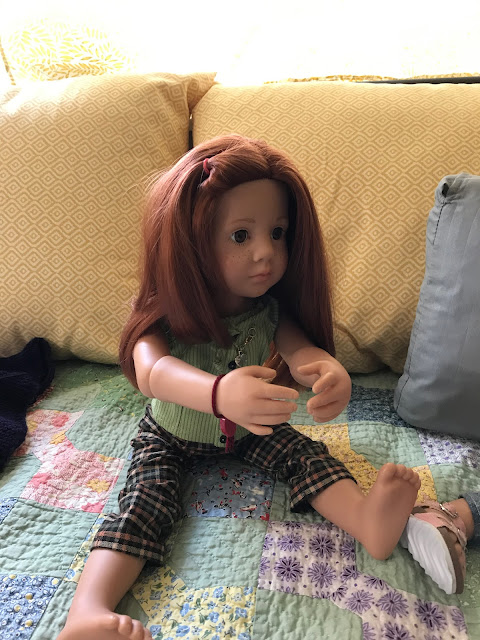"Hi," Mandy said, as Mariah and Charlotte came through the door to the workroom. "How was your trip."
"It was great fun," Charlotte replied. "I hope we can do it again."
"We got to see and do a lot of different things," Mariah agreed, once they had climbed up to the daybed where Mandy was working.
"We didn't get to swim in the ocean," she told her sister, "but The Writer let us put some water in the tub in the trailer, and we splashed around in it.
We had to work together to fill the tub water," Charlotte said after she had settled down next to Mariah. "You have to turn on hot water first and let it warm up a bit. Then you turn on the cold water and adjust them until you have the temperature you want."
"Once we had a few inches of water in the tub," Mariah added, "It was like our own little swimming pool. The Writer said we shouldn't swim in the ocean, because we might fill up with water and sink, but we could have fun in the tub instead."
"While we were gone," Mariah began, "we started wondering what makes tides happen. We saw that the level of the water changed a bit at different times of the day."
"Yes," Charlotte said. "Those big posts that were sticking out of the water seemed shorter than they had been, and the water was closer to us when we looked over the wall at the water's edge. Then, the next morning, the posts were longer again, and the water was much farther away when we looked down at the river."
"I'll help you unpack and put your clothes away," Mandy suggested, as she moved her glasses and knitting aside. The three dolls climbed over to the wicker trunk that was in front of the daybed, so they could reach the clothes cart.
"Oh, wait!" Charlotte corrected herself. "You said it wasn't really a regular river. You said it was an estuary (ES-chew-air-ee)."
"That's right," Mariah agreed, "and that reminds me, we wanted to ask you about the estuary and what causes the ocean water to come up into the river. You said it happens when the tide is high, and that's why it's an estuary."
"Well," Mandy said, as she placed Charlotte's folded bathing suit into the bag with all the other bathing suits, "what do you know about tides already?" The two younger dolls had to think back as they finished putting the clothes away and climbed down from the wicker trunk. They were still thinking when they rolled the clothes cart back to its place. Mandy let them think.
"I remember that the water gets higher sometimes and then it's lower," Charlotte told Mandy, after the three dolls had climbed back onto the daybed and sat down, "and that it's because the ocean is moving in and out."
"You said that the ocean water is salty," said Mariah, remembering the estuary, "and the water in the river is fresh, and that means the river water isn't salty."
"I remember you said that the water from the river moves toward the ocean and mixes with it," Charlotte said, "but the tide brings the salt water from the ocean back up into the estuary, and that's why it's an estuary and not a river."
Mandy nodded. "You both remember a lot," she told them.
"But why does the ocean move back and forth?" Mariah asked. "What makes it do that?"
Mandy thought about how to explain it to them. Understanding something doesn't mean it's easy to explain to others. She also knew they would remember better if they had to figure some of it out for themselves, building on what they already knew. "Well," she began, "why does the water in the river flow to the ocean."
"It's going downhill," Charlotte said. "It starts higher up on land, in the mountains, or up on land somewhere when it rains. Water always goes downhill...except with the tide. Then water can go uphill sometimes. That's puzzling."
"What makes the water run downhill and not uphill...usually?" Mandy asked.
"I remember!" Mariah exclaimed. "It's like when you drop something, and it hits the floor. Gravity pulls on it and makes it fall, so gravity must be making the water go downhill in the river."
"Yes," Mandy agreed, "and it's partly the pull of gravity that brings in the tide, too." Mariah and Charlotte were surprised, but they waited. They knew Mandy would get to it.
"The water that runs downhill," Mandy said, "or something you drop falls to the floor, is reacting to the earth's gravity. Things on earth always go down when they fall, unless something stops them, like this daybed we're sitting on keeps us from falling to the floor."
"The ocean is very big," Mandy pointed out. "It's connected on every part of the earth. There is a lot more of it than there is dry land. It's so big, it can be affected by other things besides the earth, and it's liquid except for the frozen parts, so it can move around easily."
The three dolls had seen photos of the earth, where you could see through the clouds to where the dry land was and how much of the earth was ocean.
"What is near the earth but not on it?" Mandy asked. "Something very big. Not flying above the earth, but outside of earth's atmosphere (AT-mus-feer)...outside the air around the earth," she added that last, in case they had forgotten what the atmosphere was.
The dolls knew there were satellites (SAT-uh-lites) out there, circling the earth, but they aren't very big, not the way they understood Mandy to mean.
The Space Station is out there, and it's bigger, but not very big when compared with the earth.
Besides, there have been tides on the earth since long before there were satellites or space travel. The two younger dolls thought about leaving earth's atmosphere. What was the next thing you would find after satellites? What has been there as long as the earth has?
"The moon!" they both exclaimed at once.
"Yes," Mandy agreed, "the moon and the sun, too, but the moon has a greater effect on earth's oceans than the sun, because the moon is so close. What do we know," Mandy asked them then, "about the moon and why it stays close to the earth?"
They thought for a moment. "Well," Mariah said, "I remember the moon has its own gravity, just not as much as the earth, because it's smaller."
"Yes," Charlotte agreed, "and the moon goes around the earth, so we see it in different places in the sky...or it disappears, the way the sun does."
"Yes," Mandy agreed. We say it revolves around the earth the way the earth revolves around the sun. That means it moves around in something we call an orbit (OR-bit), the way man-made satellites revolve around the earth in their own orbit. The moon is a satellite of the earth," Mandy pointed out. "Now, there's the moon out there, revolving around the earth, and as Mariah said, it has its own gravity. What do you suppose happens when all that gravity passes over all that water?"
"The water doesn't try to go to the moon, does it?" Mariah asked doubtfully.
"In a way," Mandy said. "It can't go to the moon because earth's gravity is stronger, but it's liquid, and so it moves toward the moon's gravity a bit without leaving the earth."
"Is that what makes the tide, then?" Charlotte asked.
"Yes," Mandy agreed. "I can't suck on a straw, because my mouth doesn't open, but both of you can. If you sucked some water up into the straw, it would be like the earth's oceans moving toward the moon. Then when you stop sucking on the straw, the water goes back down."
Charlotte and Mariah thought about how they could suck water through a straw if they pretended hard enough, and that they could only do that because their mouths were open a bit.
"So," Mandy continued, "when the moon is over the part of the ocean near us, its gravity moves the water toward us, but there's also a high tide on the opposite side of the earth at the same time, and that has a different cause." Mandy got some paper and a pencil. She drew a picture for the girls. She showed the earth with a lot of water on two sides of it and not as much on the sides.
It looked like this (although we've tidied this one up a bit).
"This isn't to scale," she told them, "I've exaggerated (eggs-AH-jer-ay-did) the size of the oceans––made them bigger than they are––so you can see what's happening. If I drew everything to scale, you wouldn't be able to tell any difference.
"What makes this bulge on the side away from the moon?" Mariah asked. (Charlotte had wanted to ask that question, too, so she nodded.)
"Well," Mandy began, "this part is more complicated. It would be better if I could show you." She thought for a moment. How could she show them what was happening? Then she heard the washing machine stop. That gave her an idea.
"I know," she said. "Come with me." She led the other two dolls into the laundry room. Mandy climbed up onto the washing machine, with the other two dolls right behind her. She got them to help her lift the lid to the washer, because it was rather heavy.
There were wet sheets in the washer.
"This was just full of water," Mandy said, although they knew that. "Where did the water go?
"Through those little holes," Charlotte replied.
"What made the water leave the place where the clothes are?" Mandy asked them. She let them think about it, as they all looked in at the wet sheets.
They could see that the holes in the tub were not just in the bottom, where gravity could take the water out; the holes went up the sides of the tub, too, and the sheets were smashed up against the sides of the tub.
"It spins," Mariah said. "This whole part of the washer spins, I think. Somehow the spinning makes the water leave the clothes––most of it, anyway––and the clothes stay behind, because they can't fit through the little holes."
"Exactly," Mandy agreed, "and that spinning is what makes the water bulge on the opposite side of the earth from the moon.
"Let me see if I understand it," Charlotte said. "So the the moon is spinning...um, rotating...around the earth, and the same thing that makes the water leave the wet clothes in the washer makes the oceans bulge out on the other side of the earth from the moon?"
"Exactly," Mandy said again. "That thing is called centrifugal (sin-TRIF-uh-gul) force. There are other things going on besides that when tides come and go, but that's most of it."
"These are the sheets from the trailer," Mariah said. "Let's help The Writer and put them in the dryer for her."
It isn't easy for three dolls to move big heavy wet sheets from the washer to the dryer, but there is a force that makes them want to be helpful. That same force sometimes makes it possible for them to do difficult things if they imagine hard enough. I wonder what that force is called.
Mandy: Götz Happy Kidz Katie 2015
Charlotte: Götz Happy Kidz Anna in Paris
Mariah: Götz Happy Kidz Mariah, "Chosen" from My Doll Best Friend
"The Doll's Storybook" is not affiliated with Gotz Dolls USA Inc. or Götz Puppenmanufaktur International GmbH.
Watch for the next story each Friday afternoon at 1:00 PM Pacific Time.
<a href="https://www.bloglovin.com/blog/19832501/?claim=j3fj3mbb8kt">Follow my blog with Bloglovin</a>
Copyright © 2022 by Peggy Stuart





















































No comments:
Post a Comment